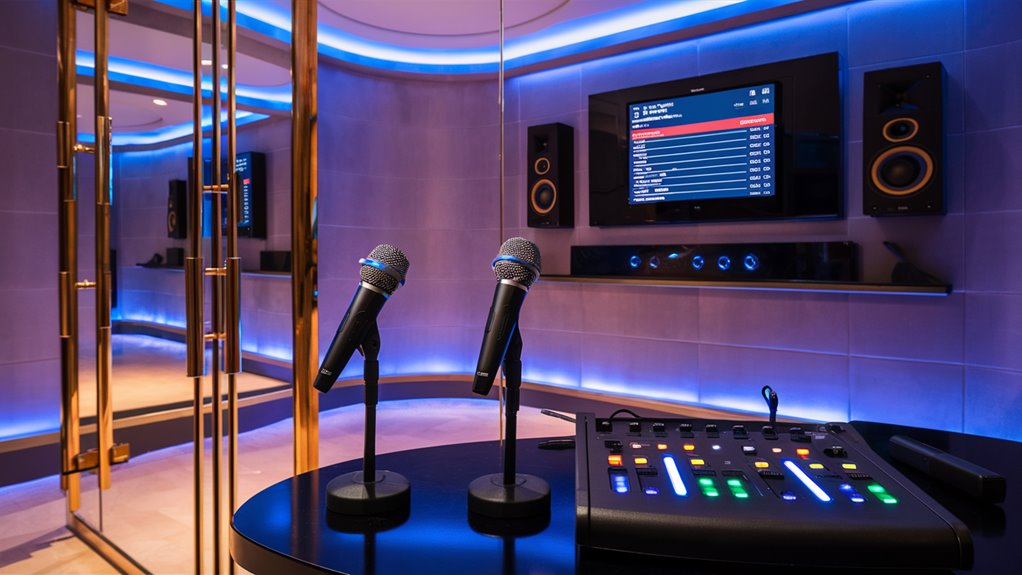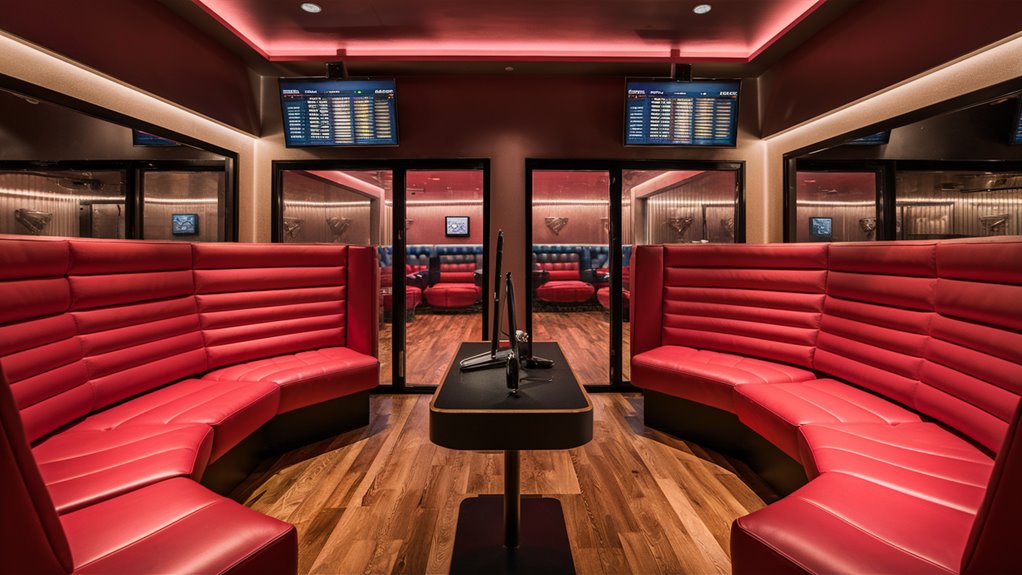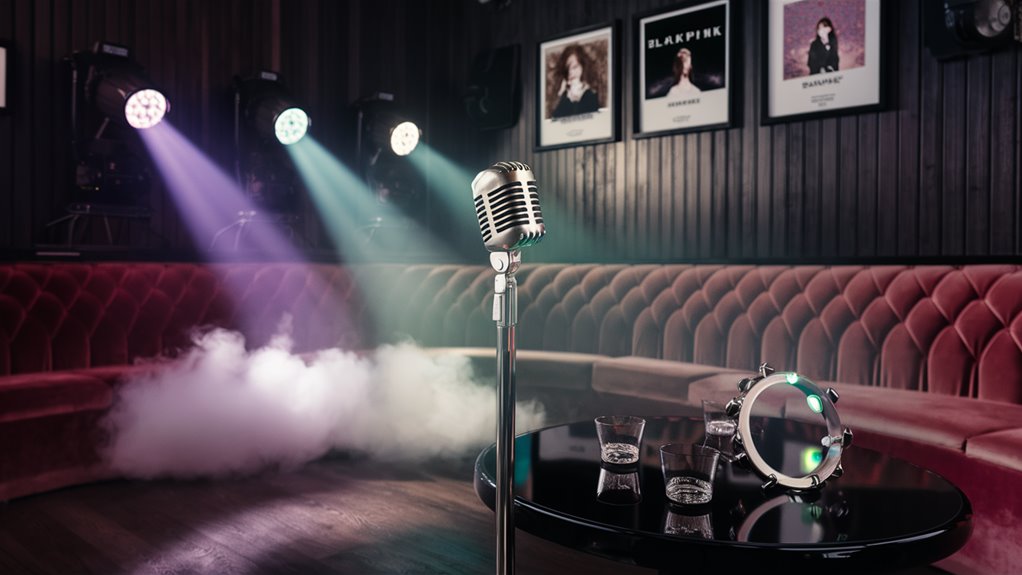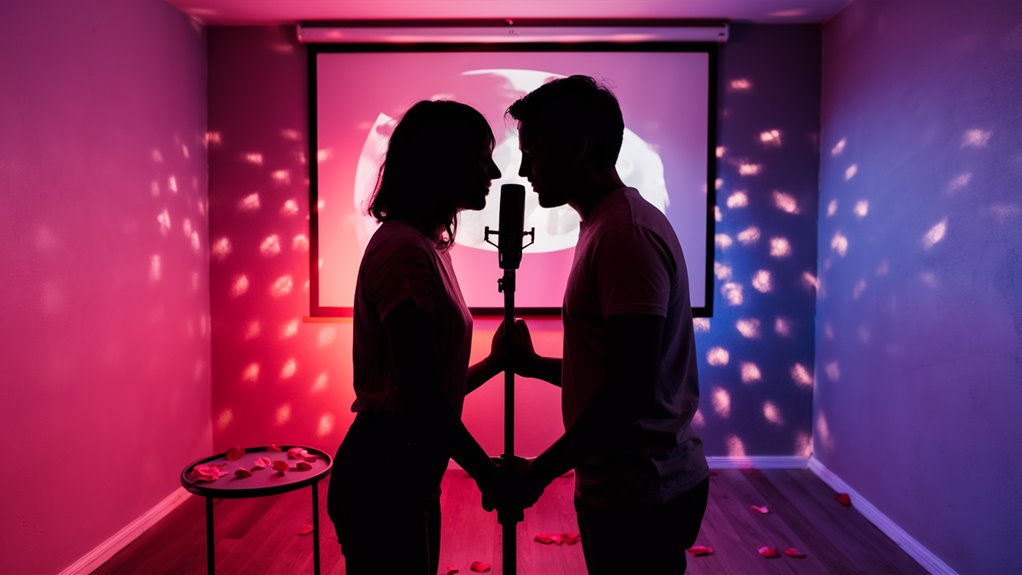Setting Up Karaoke Rooms for Events and Parties

Key Planning Tips
Start by researching venues online for karaoke room costs, user reviews, and budget-friendly options. Aim for 10-15 square feet per person, and allow extra space for dance and equipment setup.
Money Thoughts
Consider these financial details:
- Base fee for rooms ranges from $30-100 per hour
- Minimum food and drink prices
- Service fees and tips
- Cost for renting equipment
- Extended time fees for large events
Tech Needs
Before booking:
- Test the sound system and room acoustics
- Review song lists and music genres
- Check mic quality
- Verify AV equipment functionality
- Consider lighting options for ambiance
Booking Steps
Secure your spot by:
- Getting all costs in writing
- Understanding cancellation policies
- Exploring party package options
- Checking room capacity
- Confirming down payment details in writing
- Reviewing available booking hours and slots
Comparing and Choosing Venues
How to Compare and Choose Karaoke Spots
First Venue Checks
Begin by extensively researching venues online and reviewing user feedback to create a shortlist.
Focus on important aspects like sound system quality, venue cleanliness, and customer service ratings.
Utilize multiple review sites for a comprehensive understanding.
Pricing and Space Thoughts
Carefully evaluate costs, examining hourly rates and group discounts.
Monitor all financial aspects such as:
- Budget constraints
- Deposit requirements
- Cancellation policies
- Group discounts
Assess space needs to accommodate attendees.
Tech and Additional Checks
Review karaoke setups and song lists at each location. Important considerations include:
- Sound equipment quality
- Song list updates
- System user-friendliness
- Additional perks:
- Food and drink options
- Private areas
- Event enhancements
Real Use Thoughts
Assess venue accessibility aspects such as:
- Location ease
- Parking availability
- Operating hours
- Proximity to public transportation
Visit venues in person to evaluate space and test sound before booking. This ensures technical and comfort criteria are met.
Figuring Out Room Size Needs
Key Guide to Karaoke Room Size Needs
Essential Room Plans
Proper space size is crucial for an enjoyable singing experience. Aim for 10-15 square feet per person.
A group of eight should have at least 120-150 square feet for comfortable movement and singing.
Main Size Considerations
Total room size depends on factors like:
- Number of guests including extras
- Space for dancing (add 20-30 square feet)
- Placement of seating and drink stations
- Equipment setup for optimal sound and viewing
Room Features
Ceiling height is vital for sound quality and ease of singing. Maintain at least an 8-foot height to avoid sound issues and ensure proper distribution.
Strategic placement of screens and speakers ensures everyone sees and hears clearly.
For large events with food or gifts, add another 50 square feet to the base size.
Maximizing the Space
Consider these layout elements for efficient use:
- Locations for viewing lyrics
- Speaker positions for even sound distribution
- Pathways between seating
- Open areas near singing spots 여행자 주의사항 보기
- Equipment placement for airflow
Planning Costs and Budget
Everything You Need for Planning Karaoke Room Finances

Basic Cost Knowledge
Hourly room costs range widely, from $30-100 based on location and size.
Higher fees during peak times like weekend nights can be 20-30% greater. Booking off-peak can yield substantial savings from Pass Line basics to odds bets
Additional Fees and Requirements
Base costs often include a mandatory food and drink spend of $15-25 per person.
Consider essential equipment costs including:
- Mic rentals
- Song selection systems
- High-quality sound equipment
Extra Costs and Fees
Service fees and taxes add an additional 15-25% to the total price.
Include these key expenses:
- Deposit requirements (20-50% of estimated total)
- Equipment insurance
- Special event packages
- Custom song lists
- Decorative items
Ways to Manage Money
Maintain a 10% reserve for unexpected expenses.
Consider these payment strategies:
- Cost-sharing among friends
- Collecting funds in advance
- Handling payments early
- Online payment options
- Utilizing group booking tools
Clearly define minimum spend requirements and establish transparent cost-sharing rules before booking. Continuously monitor expenses to adhere to the budget during the event.
Checking Equipment and Song Options
Essential Guide to Karaoke Equipment and Songs
Equipment Checks
Testing the sound system is vital for a successful karaoke event. Start by checking mic sound and setting volume levels to avoid disruptions during the event.
Ensure all display screens function correctly and that sound outputs are clear, strong, and free from distortions or interruptions.
Song List Management
A thorough evaluation of the song list is crucial when preparing for karaoke. Modern digital karaoke systems often feature extensive music libraries with diverse tracks.
Verify the availability of preferred music and special songs. Assess the system’s search capabilities and update frequency to ensure access to both new hits and classic favorites in their original formats.
Technical Setup Requirements
Ensure the venue provides enough mics for your group size, including wireless options for easier mobility. Test all remote controls and familiarize yourself with basic troubleshooting procedures.
Monitor venue system controls, such as lighting and temperature adjustments, as these significantly impact comfort during extended karaoke sessions. Good equipment maintenance and timely system updates ensure optimal performance throughout the event.
Clarifying Booking Details
Complete Guide to Securing Venue Bookings
Essential Booking Information List
Initiating the booking process involves documenting critical information. Compile a comprehensive booking list including:
- Number of attendees and their information
- Date and duration of the event
- Start and end times
- Special requirements
- Food and drink preferences
Financial Thoughts and Policies
Thorough financial information is crucial for effective planning. Obtain detailed insights on:
- Deposit requirements
- Hourly rates
- Charges for additional hours
- Minimum spend policies
- Price variations during peak times
Discussion Rules at the Venue
Securing a written agreement ensures protection. Request documentation on:
- Cancellation procedures
- Payment methods
- Credit card hold policies
- Timing regulations
- Event specifics
Planning Special Events and Settings
Organizing an event requires detailed discussions on:
- Special event packages
- Group discount options
- Decoration policies
- Outside food rules
- Venue management practices
Communication with Venue Managers
Preparing for potential issues involves:
- Manager contact details
- Direct phone numbers
- Alternate communication channels
- Day-of-event procedures
- Solutions for potential problems


